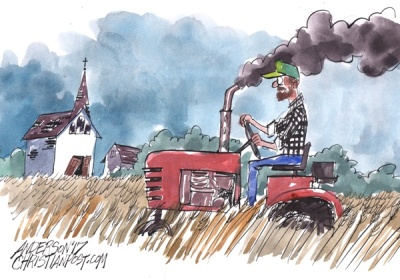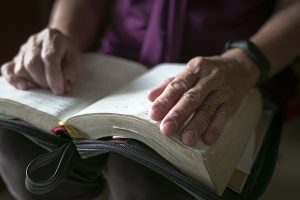2 keys to the recent growth of the rural church

Last year between 10,000 and 20,000 peoplemoved to New Hampshire. That may not seem like much, but with just 1.3 million people total in my state, and 47% of those living in rural communities, this number is not insignificant. Every day it seems as though urbanites are finding a home in less-populated areas.
And New Hampshire is not alone. Covid-19 has uprooted millions of people who have moved for many reasons — fear of the next pandemic, lower cost of living, benefits of remote work, proximity to family and friends, change of scenery and pace. Rural communities, specifically, are seeing an uptick in numbers. And millions more, according to aGallup poll, may be on their way, with 48% of Americans saying that if they could live anywhere, they would choose a town (17%) or rural area (31%). This is up 9% from previous years.
As a pastor, this both excites me and raises some anxieties. It seems as though God has given those of us in rural contexts a wide-open door to reach more people for Christ. And yet, are we prepared for the ways this may change our communities?
But as people are flocking away from cities, we want to receive them with open arms and genuine gladness. We want to be the welcoming presence of Jesus to those who are seeking refuge, safety, and peace. Let me share two ways I believe we can do this well: first, through the strategic planting of churches, and second, by ensuring the right leaders are in the right places.
The right church
Planting and leading a church in a rural context first requires an understanding of the community. If we enter these close-knit, deeply rooted communities with an air of pride or arrogance, we will most likely fail.
To understand rural communities, it helps to begin by naming several false narratives we have come to believe: (1) that rural pastors are unhappy and have a low quality of life, and (2), that, as Stephen Witmer confronts in his 2019 book, A Big Gospel in Small Places, smaller and slower is a sign of failure. In a world that teaches that bigger is better and numbers are the holy grail, pastoring in a small community in the middle of nowhere may seem illegitimate — a small calling for those not qualified for other jobs. But for most rural pastors, it’s anything but that. As I’ve met with pastors across the nation through Acts 29 Rural, I’ve lost count of the number of people who have demonstrated just the opposite.
As we emerge from the Covid-19 pandemic, we would benefit from taking the time to get to know our surroundings before jumping back in. Churches in rural contexts are indeed places that may have fewer educational opportunities, less access to good healthcare, fewer work opportunities, less access to mental health services, and more financial strains due to fewer job opportunities. And yet, the challenges of those living in rural settings can also be their greatest asset. The obstacles can bring the people closer together and allow for creative, collective answers to systemic and individual problems.
As people move to rural settings and we begin to plant new churches and grow existing ones, now is an excellent opportunity to ask where God would have us go. To build a church of the community, not simply one that is in the community.
The right leader
This type of work requires a specific type of leader. Although not researched, some estimate that half of church-planting pastors in rural contexts do so in their hometowns. This means that half are transplants to the community. There are pros and cons for both groups. The former group may have familiarity with their community but lack creativity. The latter group may bring fresh ideas but lack context. This is where the bi-vocational ministry option comes in.
Although not necessarily the ideal scenario for those who have bought into a model of pastoring that only includes full-time ministry, the bi-vocational pastorate may be the most fruitful and fulfilling opportunity many in leadership will find. Many rural churches cannot afford to pay for a full-time salaried pastor. And yet, because of this, bi-vocational pastors now find themselves in the heart of the community — in the marketplace of ideas and struggles and challenges. This is where Jesus found Himself as well.
No longer an outsider, the pastor can better understand the obstacles that those in the community face when it comes to balancing work, family, and other responsibilities. This can lead to great rewards as these relationships grow and the pastor is seen as not just a church leader, but as a friend and fellow journeyman.
How many of us have had our best Gospel conversations over coffee with a co-worker or after a baseball game with another coach? This is what happens in bi-vocational ministry. The Gospel can be integrated fully into the community and context as the spiritual meets the physical.
Despite the challenges they face, many who live in rural contexts are rich in community and spirit. They have grit and perseverance as they wrestle with hopelessness and skepticism. They are proof of God at work in hard places.
And the bi-vocational pastors who serve there are as well — so much so that they are forced to press into personal challenges for the sake of those around them. They live in the community with the ones they are serving. Their lives are fishbowls, but this doesn’t stop them. They love to be pastors and do so without fame, glory, or money. In my estimation, this is anything but an “illegitimate” calling.
One life at a time, we are sensing a genuine Gospel optimism for small-town renewal.
When churches are planted with an understanding of the community around them, and leadership models are built around honoring the community and integrating it with the life of faith, no one knows all that God might do. What we do know is that God wants to do much, and He is opening wide the doors into rural areas.
David Pinckney is a Rural Strategist for Acts 29 and pastor of River of Grace Church in Concord, NH.




























